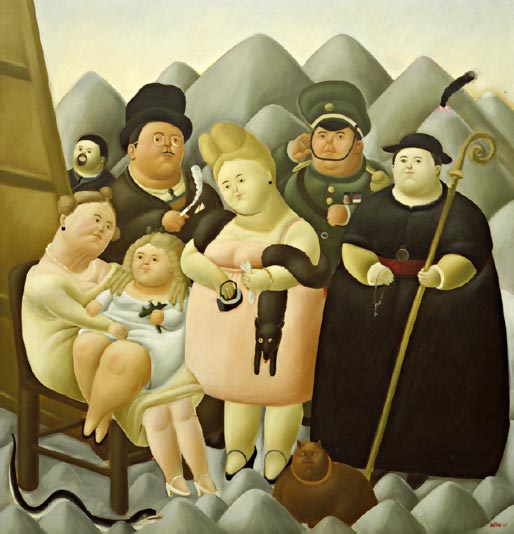The "Ways of Leaving" section starts off with "At the Platform, Newcastle." I particularly like the lines: "there was none of the pain / you'd expect until the train pulled / out and the piece of us / that is time / ripped apart."
The rupture between family or friends separated by a journey, esp. a long and perhaps permanent one, can be quite challenging. I actually have fairly weak ties to most people, but still, it does seem preferable in terms of emotional impact to be the one who leaves (since one usually has something to look forward to at the end of a journey). Certainly, in general I've lived up to my vow to be the leaver and not the leavee. Probably my favourite set of paintings on this theme are at the MoMA -- they are called States of Mind by Umberto Boccioni.
 |
| The Farewells |
 |
| Those Who Depart |
 |
| Those Who Stay |
These images could have been appended to the post on mobility/rootlessness, but that was pretty long as it was. And they do seem to fit the poem in the sense that the journey is a train journey.
Perhaps even more central (than struggling with religion) to the final section of Mortal Arguments ("Patience") is wrangling with death and/or oblivion. Indeed, the poet declares in "St. Phillip's": "No one really / believes in death or dying, / its unwilled oblivion."
However, the voice is less convinced in "Dusk": "Under the surgical gaze of the stars / we bare ourselves, wait to see what can be done."
And in "Forever" death is imagined almost as a parlor trick (on the unwitting): "you can't imagine / that time might turn itself inside out, showing / that what you thought was the infinite / was only its lining." After death, friends and family members "will pull a square of bright silk ... / then let it go, watch it drift away." This is certainly one of the more melancholy poems of the collection. Though the conclusions drawn may be a bit different, it does have interesting parallels with my poem, "My Tailor."
Turning to Breaker, the poems that explore religion and/or the sublime are not as fresh or seem a bit cruder than in Mortal Arguments. But I think Sinclair still rises to the occasion with slightly off-center language and metaphor. Though in terms of the percentage of poems where this stands out may be slightly lower (and more poems come across as a bit more straight-forward and perhaps not as carefully constructed with thought-provoking metaphors).
I like the first stanza of "Sunburst," but am not as interested where the poem goes afterwards:
"Objects in their endless sleep,
hearts beating once, maybe
twice an hour. The clouds drifting
just under the skin of the visible."
In "St. Philip's, Rain," the relationship with the divine seems very fraught: "the rest of us sick with longing for a god / we no longer believe in, our faces / like spoons, plain and hungry." While not everyone feels this need to believe, Sinclair expresses this longing well.
"Metropolis" contains interesting metaphors: "The city is a piano, its pedals sunk / deep underground." Then "We [commuters or city dwellers in general] become paper shredders for obsolete decades." I don't even know precisely what this means, though it may well be discussing the idea that cities (which are dominated by gesellschaft relations) are part of the project of modernity and that the past is routinely churned up and discarded. Sinclair continues with this thought: "History might disappear entirely if we work hard enough."
Sinclair has a few other urban poems -- often looking what happens when "routine" city life is disrupted or interrupted. In "Blackout," people "prowl the streets, greet everyone / as the intimate strangers we've become / ... soon a line of bicycles glides past, following / the glow of a single headlight as though / chasing a butterfly."
In addition to the shout-out to bicycles, Sinclair sneaks in a few poems on transportation into Breaker, and these are generally the ones I like most. "Driving North" focuses on night-time driving, ferries turn up in "Sixth View of Bell Island" and both "Delay" and "View from the Train" are about train rides. In "Delay" the train never arrives. "All of us thinking about home and how / we're not there and will or won't be missed, / how the surface of our life goes on elsewhere / even as we stand here."
Yet Sinclair suggests it isn't such a great thing to be on the train after all in "View from the Train": "The air in the car is sour with the breath / of strangers ... / The train pushes steadily on, / repeating the same clicks and clacks, chugging along as if / it will never stop."
To return to the Boccioni paintings, Sinclair definitely seems to be suggesting that the difference between the two phases of staying and going are not nearly as clear cut as they seem at first, or more centrally that one's personal satisfaction is probably not going to be altered that much by being on a moving train or being left on the platform. I'm not at all sure I would agree with her, esp. if one is stuck on a platform but expected to be on the train, but there is certainly something to the notion that people make all kinds of changes in their situation (like going on journeys) and then end up no happier than before they set out.
Breaker is definitely another thought-provoking collection with a number of poems I enjoyed, though I do rank Mortal Arguments somewhat higher.









